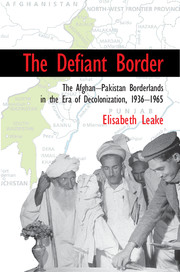Book contents
- Frontmatter
- Contents
- Preface and Acknowledgments
- List of Abbreviations
- Maps
- Introduction: “A Doughty and Honourable Opponent”: Historicizing the Afghan– Pakistan Borderlands
- 1 “Using a Crowbar to Swat Wasps”: The Frontier Tribal Area in Imperial Defense
- 2 The “Opening of Sluice- Gates”: Plan Partition and the Frontier
- 3 “We Are One People and Ours Is a Land”: The Demand for Pashtunistan, 1948–1952
- 4 A “Friendly Point of Return”: Pakistan and the Global Cold War
- 5 An “Eye for an Eye”: Mohammad Ayub Khan and the Collapse of Regional Relations
- Conclusion: “Religion, Land, Lineage and Honour”: The Afghan–Pakistan Borderlands Then and Now
- Index
Preface and Acknowledgments
Published online by Cambridge University Press: 20 January 2017
- Frontmatter
- Contents
- Preface and Acknowledgments
- List of Abbreviations
- Maps
- Introduction: “A Doughty and Honourable Opponent”: Historicizing the Afghan– Pakistan Borderlands
- 1 “Using a Crowbar to Swat Wasps”: The Frontier Tribal Area in Imperial Defense
- 2 The “Opening of Sluice- Gates”: Plan Partition and the Frontier
- 3 “We Are One People and Ours Is a Land”: The Demand for Pashtunistan, 1948–1952
- 4 A “Friendly Point of Return”: Pakistan and the Global Cold War
- 5 An “Eye for an Eye”: Mohammad Ayub Khan and the Collapse of Regional Relations
- Conclusion: “Religion, Land, Lineage and Honour”: The Afghan–Pakistan Borderlands Then and Now
- Index
Summary
I was introduced to Pakistan's frontier tribal area as an undergraduate at Yale University, where hours spent reading Kim, watching The Man Who Would Be King, or debating more critical questions about imperial governance with Paul Kennedy sparked my interest in the region. Ever since, Paul has continued to show eager interest in the progress of a book that likely would not have emerged without those early discussions. At the University of Cambridge, Christopher Bayly generously and kindly guided me through my doctorate. Chris was the best of mentors, constantly providing wise advice, trips to the pub, and a wry sense of humor. He went to great lengths to help this book develop, even having an emergency cup of coffee in Washington, DC, during an eight-hour layover. I am particularly grateful for Chris's encouragement to blur the boundaries between global and regional histories and not to submit to any particular classification. I am deeply saddened that Chris did not live to see this book's publication, but I hope it can live up to his legacy.
I am grateful for the financial support provided by the Cambridge Overseas Trust, Faculty of History, Smuts Memorial Fund, Cambridge–India Partnership, and Corpus Christi College during my doctorate, and for a subsequent fellowship at Royal Holloway, University of London, funded by the Leverhulme Trust and the college. The University of London's Isobel Thorney Fund generously paid for the cover image and other help. I am further indebted to the wonderful archivists, librarians, and staff at the British, U.S., and Indian National Archives, the National Documentation Centre in Islamabad, the British Library, the Eisenhower Presidential Library, the Imperial War Museum, and the Churchill College Archives Centre.
I have incurred numerous debts through the writing of this book, most of which I can never hope to repay. Daniel Haines took time from his own research to guide me through Islamabad, and he also has read more drafts of this book than either of us would care to admit. Tahir Kamran and his family generously facilitated my research trip to Islamabad, making me feel so welcome, as did Samina Awan.
- Type
- Chapter
- Information
- The Defiant BorderThe Afghan-Pakistan Borderlands in the Era of Decolonization, 1936–65, pp. ix - xiiPublisher: Cambridge University PressPrint publication year: 2016



